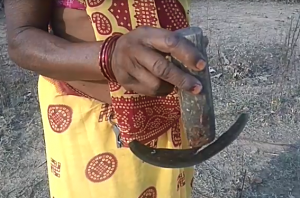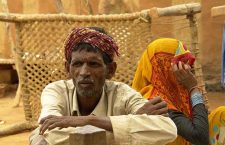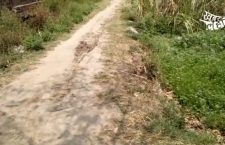 Kicking off the special series Dalit: Kaam, Pehchaan, Rajneeti, as part of Dalit History Month, we get under the belly of that beast of dual discrimination, up-close with the cattle skinners of Bundelkhand.
Kicking off the special series Dalit: Kaam, Pehchaan, Rajneeti, as part of Dalit History Month, we get under the belly of that beast of dual discrimination, up-close with the cattle skinners of Bundelkhand.
In Bundelkhand, if you’re being called “chamaar”, rest assured assumptions have been made of you, your families’ professions, your lifestyles, your morales. The chamaars of Bargadh, Manka and Turgava villages in the Mau block of Chitrakoot, a district of Bundelkhand in U.P., better known for its shining appearances in the Ramayana, no less, are those Dalit communities whose traditional occupations have been of cattle-skinners. The trade and techniques have been passed on from generation to generation; as Ram Babu, of neighbouring district Banda says, “It’s been a generational profession, so we saw our grandfathers and fathers doing it, and we simply followed it… But now the younger generations don’t want to.” Ram Babu is alluding to the dual discrimination inherent in the trade that has ensured a huge decrease in this profession – in Chitrakoot, if 70% of the community was in the trade, now it is only 5%. Close to 20% of the Dalit community who’ve been in the trade have moved to the more “respectable” (read: socially accepted) leather-based profession of cobblers. As Rakesh, cobbler says, “Earlier, the entire mohalla was involved in it. Now I think there are about five people left in my own village.”
Another Bargadh local Umakant Ojha says, “Mainly, it’s stopped in Bargadh now. there’s been a steady decrease over the past 10 years.”
This dip is in a way, inversely proportional to an important spike – according to the NCRB 2014-2016 data, U.P. witnessed an increase of upto 29% in caste-based violence. And while crimes are still an accounted for statistic, discrimination, which is largely in the social sphere, is almost always unrecorded, and simply a part of the socio-cultural fabric. Sonpal Varma, local BSP neta, calls it a “special kind of viewing of these people, as those outside the mainstream, and best if avoided”.
Prabhavati, Chitrakoot, speaks of the dual discrimination clearly, how the community that had been traditionally involved in the trade shuns those who continue to work in it, “We haven’t told our relatives we do this work, of course not. Who will marry our girls and boys if we do? So, we continue to do this work in secret.”
Shockingly, Shakti Pratap Singh, the BJP representative for RK Patel, the MLA in Karwi, Chitrakoot, is in denial of any discrimination, “It probably used to happen years ago, But not anymore.” Mahendra, meanwhile, who’s considering quitting the trade and even planning an exodus from the village altogether, tells us of what they face on a daily basis, “The Brahmins and the pandits all look at us as dirty, that is but natural. It is dirty work.”
He continues, “We keep thinking about leaving this profession, but the farmers keep calling us, ‘hamaara kaam kar do’, and we go. Because what can they do when their cattle dies? They simply throw the carcasses out in the outskirts of the villages and we go and collect them from there… There is some money, but money isn’t everything. How long can we live as shunned human beings?”
– Pooja Pande
This story is Part I of an ongoing Dalit: Kaam, Pehchaan, Rajneeti special series through this Dalit History Month, for which we’re partnering with Firstpost.

